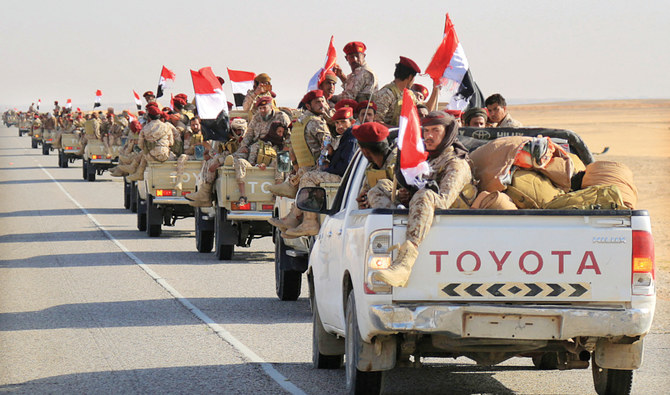AL-MUKALLA: The Arab coalition supporting the Yemeni government carried out new airstrikes on Sunday, targeting a military camp in Houthi-held Sanaa and rebel reinforcements in Marib Governorate.
The coalition said in a statement on Sunday that it destroyed weapon depots at a military camp controlled by the Houthis, urging residents not to pass through or congregate near targeted military sites in Sanaa.
Residents in Sanaa reported hearing large explosions as images on social media showed smoke billowing from the targeted sites.
On Saturday, the coalition launched a large-scale military operation against the Houthis in Yemen, shortly after a missile fired by the militia killed two civilians in Saudi Arabia’s Jazan.
The coalition vowed to punish the Houthis for targeting civilians in Yemen and across the border in the Kingdom.
At the same time, local media reported on Sunday that the latest airstrikes by the coalition in have prompted the Houthis into replacing officials and arresting members on suspicion of being coalition spies.
Quoting a source close to the Houthi movement’s Supreme Council, Al-Sahil Al-Gharbi, a news site affiliated with Yemen’s former president Ali Abdullah Saleh, reported that the militia was taken aback by the coalition air raids on their command rooms, secret military sites and officials.
The movement accused guards of sending key coordinates to the coalition and subsequently changed security and intelligence protocols, including residences, guards, communications and meeting times, the news site said.
On the ground, coalition jets struck Houthi military gatherings and vehicles in the province of Marib, where government forces are battling aggressive rebel attacks, Abdu Abdullah Majili, a Yemeni army spokesperson, told Arab News on Sunday.
The airstrikes thwarted Houthi attempts to reinforce their dwindling forces in Marib and paved the way for government forces to retake territory, Majili said.
Dozens of combatants were killed in heavy fighting between government troops and the Houthis over the past 24 hours in sites south of Marib, as the Houthis continuously attacked government loyalists.
Majili said that the latest fierce fighting occurred around the Al-Balaq Al-Sharqi mountain range on the southern edges of the city.
Thousands of combatants and civilians have been killed since February when the Houthis renewed a major military offensive to capture the energy-rich city of Marib, the government’s last bastion in the north.
Also in Marib, government officials and local human rights activists strongly condemned a Houthi missile strike on a petrol station in Marib that claimed the lives of three civilians.
A missile fired by the Houthis on Saturday exploded inside a compound of buildings, an oil station and an automobile repair shop in Marib city, killing three civilians, including a child, and wounding eight more.
Two more missiles fired by the militia also hit other locations in the densely populated city over the past two days.
Muammar Al-Eryani, Yemen minister of information, culture and tourism, tweeted that the Houthis intensified missile attacks on residential areas in Marib after failing to make military gains on the fronts outside the city.
“The targeting of residential areas in Marib using three Iranian-made ballistic missiles is a hysterical and cowardly act. It reveals the scale of losses the Houthis have incurred on fronts and its indifference to the fate of millions of residents in the city,” he said.
Separately, Yemen President Abed Rabbo Mansour Hadi on Saturday appointed Awadh Mohammed Al-Wazer Al-Awlaki, an influential tribal leader, an MP and a member of the General People’s Congress party, as new governor of the oil-rich province of Shabwa, replacing Mohammed Saleh bin Adeo, who was named as a presidential adviser.


























